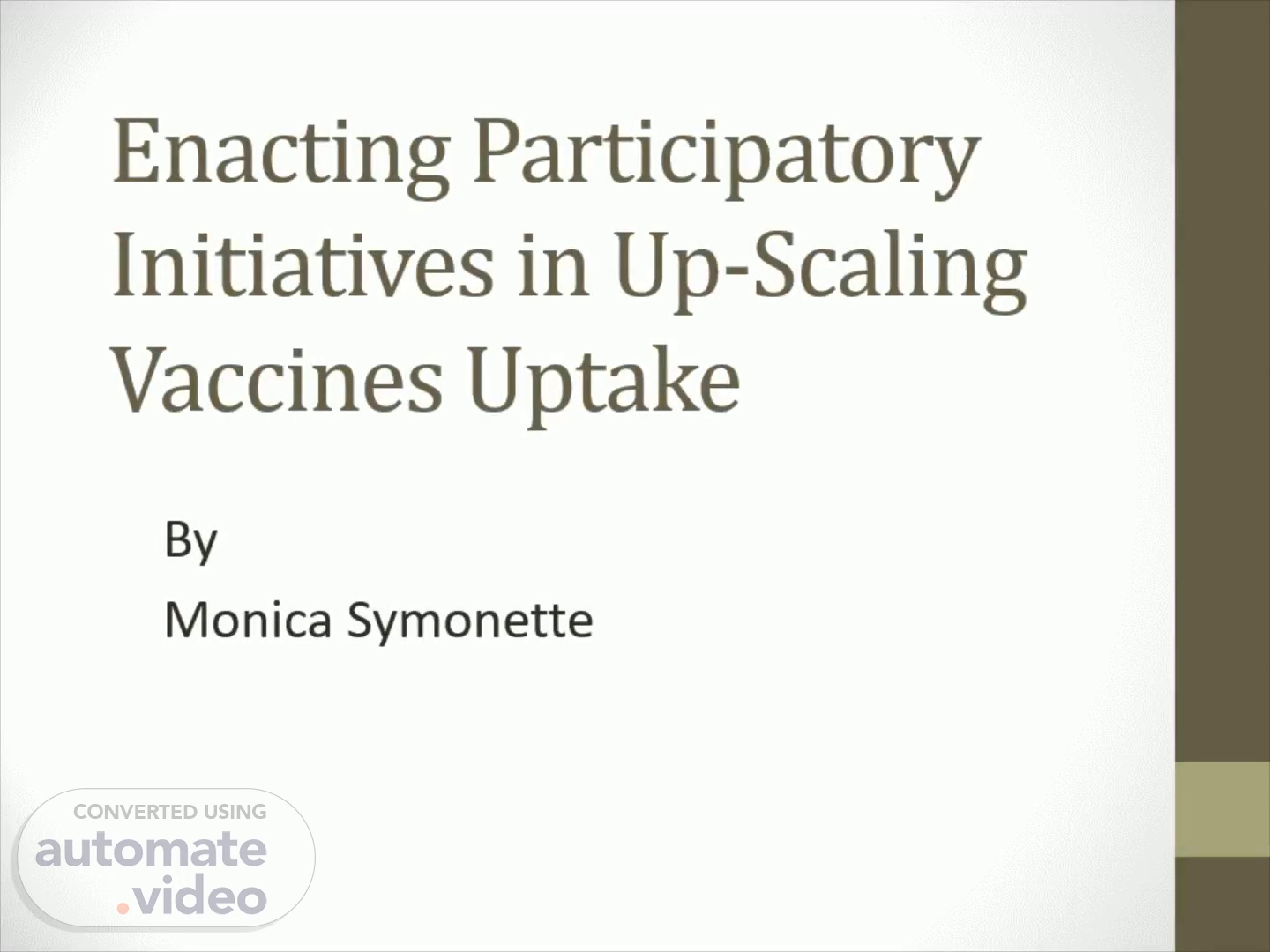
Enacting Participatory Initiatives in Up-Scaling Vaccines Uptake
Scene 1 (0s)
[Audio] Hello everyone. My name is Monica Symonette and I am hereby presenting on "Participatory initiatives' in relation to the up-scaling of Vaccines Uptake in the community..
Scene 2 (13s)
[Audio] The topic is interesting based on three main reasons. One reason is that it touches on a very crucial subject covering issues affecting Vaccination in the society. Secondly, discussing this information will go a long way in contributing to the academia on the appropriate strategies to handle current and future Severe Acute Respiratory Syndrome ( SARS) plus associated epidemics. The last reason for preferring this topic is to bring an understanding that can help in fostering enhanced Vaccine uptake among individuals in the society..
Scene 3 (50s)
[Audio] In this presentation, I will introduce a participatory initiatives within nursing and community health. I will also provide a background on how the issue has been developed. The discussion will also address the impact of the participatory initiative in nursing, healthcare, and patients. Ultimately, I will recommend the use of Participatory initiatives in enhancing COVID 19 vaccination uptakes in the community..
Scene 4 (1m 20s)
[Audio] Focusing on the participatory initiative's background, the Alma Ata 1978 provisions on community involvement in healthcare provision. As a result, patient involvement in care started taking shape from that time to date. Patients participation is mainly in the planning, organizing, operation, and control for healthcare initiatives. Nurses or medical professionals can collaborate with the patients in developing programs and initiatives that help in preventive care, or advocacy for a better lifestyle..
Scene 5 (1m 55s)
[Audio] Before focusing on the specific bioethical issues related to participatory approach, it would be important to understand the advantages and disadvantages associated with the initiatives. The advantage of participatory initiative is that The patients or community gets empowered, are effective, responsive, and enhance their capability. Besides, the participatory initiatives promote or leads to self-reliance. On the other hand, the processes may be limited to professional elitism or classes. Also the planners may end up uncertain of the results since they have to consider the input from patients, or even practitioners. Diversity of needs among the patients may also limit the effectiveness of Participatory initiatives..
Scene 6 (2m 45s)
[Audio] The first bioethical issue surrounding participatory initiatives is the abuse of technology. Most of the practitioners are now using modern technologies to reach out to their patients. The use of such platforms seems to deviate from the mainstream healthcare procedures with communities and patients seeking more information from the platforms as opposed to physically going for checkups..
Scene 7 (3m 11s)
[Audio] COVID 19 Vaccination is an issue that can be adequately addressed if the appropriate PI approach is to be utilized. COVID19 Vaccination rolled out based on intention to manage the spread of the SARS-CoV2 or Coronavirus. Researchers embarked in developing the vaccines, and the deployment was done under the direction of the Food and Drugs Authority. However, we noted that some practitioners were opposed to the process citing less involvement in the process. Community involvement can enhance the uptake of Vaccinations without necessarily leading to mandatory processes. Nonetheless, the concerns of less PI leads to diverted attention to ethical and trust-related considerations, such as privacy, confidentiality, and consent..
Scene 8 (4m 3s)
[Audio] The PI approach should be procedural and involve an outreach, the consultation, the involvement, collaboration, and the realization of shared leadership. Some of the practitioners felt side-lined and a division was noted. PI is meant o foster better community involvement, enhance trust, and ensure a seamless communication among the stakeholders..
Scene 9 (4m 28s)
[Audio] In conclusion I can recount that participatory initiative involves engagement of patients and community in the planning and execution of healthcare programs. Therefore, the aforementioned bioethical concerns can be handled better through incremental community involvement to ultimately realize shared leadership..
Scene 10 (4m 48s)
References. Beier , K., Schweda , M., & Schicktanz , S. (2019). Taking patient involvement seriously: A critical ethical analysis of participatory approaches in data-intensive medical research. BMC Medical Informatics and Decision Making , 19 (1). https://doi.org/10.1186/s12911-019-0799-7 Haldane, V., Chuah , F. L., Srivastava , A., Singh, S. R., Koh , G. C., Seng , C. K., & Legido -Quigley, H. (2019). Community participation in health services development, implementation, and evaluation: A systematic review of empowerment, health, community, and process outcomes. PLOS ONE , 14 (5), e0216112. https://doi.org/10.1371/journal.pone.0216112 OECD. (2021, May 10). Enhancing public trust in COVID-19 vaccination: The role of governments . https://www.oecd.org/coronavirus/policy-responses/enhancing-public-trust-in-covid-19-vaccination-the-role-of-governments-eae0ec5a/ Ringdal , M., Chaboyer , W., Ulin , K., Bucknall , T., & Oxelmark , L. (2017). Patient preferences for participation in patient care and safety activities in hospitals. BMC Nursing , 16 (1). https://doi.org/10.1186/s12912-017-0266-7. Sprague, L., Afifi , R., Ayala, G., & El- nasoor , M. L. (2019). Participatory praxis as an imperative for health-related stigma research. BMC Medicine , 17 (1). https://doi.org/10.1186/s12916-019-1263-3.